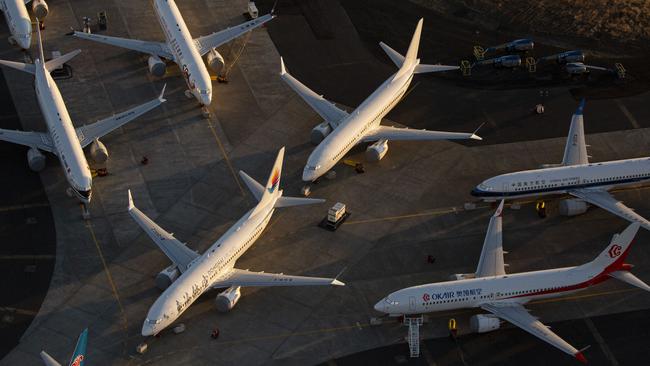Boeing tried to minimise need for pilot training on 737 MAX
A former senior Boeing pilot complained he felt pressure from management to ensure the 737 MAX wouldn’t require expensive pilot training.

Mark Forkner, a former senior Boeing pilot publicly vaulted into the company’s 737 MAX crisis, complained years ago that he felt pressure from management to ensure the series of jets wouldn’t require expensive pilot training, according to former colleagues.
Mr Forkner, who at the time was the chief technical pilot for the MAX and who is a focus of a federal inquiry into the jet’s development, became well known on Friday when internal messages that Boeing turned over to congressional investigators suggested he might have had concerns about the plane’s flight-control system after encountering problems in a simulator.
Federal agents have in the past few months questioned Mr Forkner’s former co-workers and supervisors about their efforts to develop the 737 MAX, the latest version of Boeing’s best-selling jet, according to people familiar with the matter. Some of the questions related to his successful effort in 2016 and 2017 to persuade the Federal Aviation Administration not to require extra simulator sessions before allowing MAX pilots to fly passengers.
Mr Forkner’s lawyer, David Gerger, declined to address questions about his client, who is now assisting with technical matters at Boeing’s largest MAX customer, Southwest Airlines Co.
Mr Gerger told The Wall Street Journal on Monday: “Mark flew the MAX. His air force buddies flew the MAX. He would never put himself, his friends or any passenger in an unsafe plane.”
According to a fellow pilot who worked closely with Mr Forkner at Boeing, Mr Forkner repeatedly indicated to this ex-colleague that he feared losing his job if the FAA rejected Boeing’s arguments to minimise training, and the fellow pilot recalled making that point in an interview with the FBI.
That interview is part of the widening Justice Department investigation into how the MAX was designed and certified as safe by the FAA and whether Boeing officials may have misled regulators as part of that process.
Boeing didn’t respond to a request for comment about pressure on Mr Forkner.
Over the weekend, the company said it was investigating the circumstances surrounding the internal messages.
“We understand entirely the scrutiny this matter is receiving and are committed to working with investigative authorities and the US Congress as they continue their investigations,” the company said. A Justice Department spokesman declined to comment.
On Tuesday, Boeing removed Kevin McAllister as head of its commercial aeroplanes unit, making him the highest-profile departure from the company since the MAX crisis.
The FBI, which is working with the Transportation Department’s Inspector-General’s Office, is looking into whether inaccurate statements, incomplete technical submissions or undue management pressure inside Boeing contributed to two fatal crashes of MAX jets in less than five months.
Misfire of an automated flight-control feature known as MCAS led to the accidents that took a total of 346 lives and grounded the global fleet in March.
Mr Forkner’s responsibilities at Boeing focused on pilot-training issues and devising manuals for the fleet. One of his main objectives was to make sure airlines purchasing the MAX wouldn’t have to pull pilots off money-making passenger flights for additional training.
Rick Ludtke, a former Boeing flight deck engineer who worked with Mr Forkner, said: “Mark was under an enormous amount of pressure. He clearly was stressed.”
Some of Mr Forkner’s former colleagues recall him as an honest co-worker who wasn’t able to fly much at Boeing because of labour disputes and budget issues affecting the group he worked in.
One former colleague described him as someone with the character to take a stand over safety issues. The fellow pilot said some co-workers were surprised when Mr Forkner, known as an avid Seattle Seahawks fan, took the Southwest job and relocated to the Dallas region, leaving a large group of relatives behind.
When Mr Forkner’s internal Boeing messages to another pilot emerged on Friday, Southwest Airlines Pilots Association president Jon Weaks said the messages showed “Boeing misled pilots, government regulators and other aviation experts about the safety of the 737 MAX”.
In the documents that congressional investigators have gathered, which total hundreds of thousands of pages, is a Boeing marketing brochure for the MAX that advertised the jet wouldn’t require significant additional pilot training, according to Peter DeFazio, the Oregon Democrat who chairs the House Infrastructure and Transportation Committee.
Boeing has said that was a design objective which was “always subordinate to other requirements, including safety”.



To join the conversation, please log in. Don't have an account? Register
Join the conversation, you are commenting as Logout